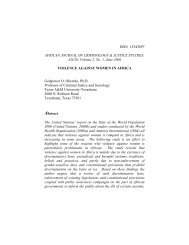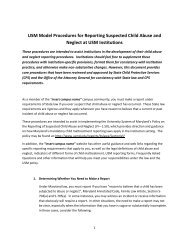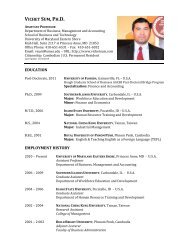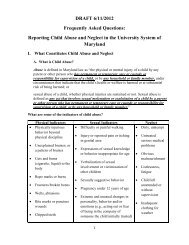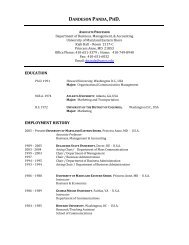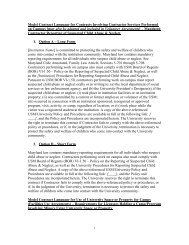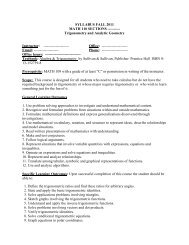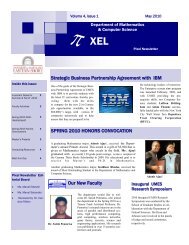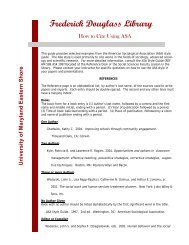Download - University of Maryland Eastern Shore
Download - University of Maryland Eastern Shore
Download - University of Maryland Eastern Shore
You also want an ePaper? Increase the reach of your titles
YUMPU automatically turns print PDFs into web optimized ePapers that Google loves.
HIPAA is the Health Insurance Portability and Accountability Act <strong>of</strong> 1996. It is a federal law<br />
effective as <strong>of</strong> April 2003. This law protects the privacy <strong>of</strong> a patient’s personal and health care<br />
information. Violations <strong>of</strong> the law can result in fines up to $250,000 and in jail sentences up to<br />
10 years.<br />
Who has to follow the HIPAA law?<br />
Everyone<br />
When does the law have to be followed?<br />
Now<br />
Why is HIPAA important?<br />
HIPAA protects our privacy and the security <strong>of</strong> information about us when we are patients. It’s<br />
the law and it’s the right thing to do.<br />
What patient information must we protect?<br />
All information about an individual who is a patient <strong>of</strong> a health care service is private or<br />
confidential. The information may be written on paper, saved on a computer or spoken. HIPAA<br />
refers to this information as Protected Health Information (PHI).<br />
PHI includes:<br />
- A person’s name, address, phone numbers, e-mail address, age, birth date, social<br />
security number<br />
- Medical records including the reason for seeking health care, diagnosis, prescribed<br />
treatment and medications, x-rays, lab work, test results<br />
- Billing records including claim information, referral authorizations, benefits explanations<br />
research records<br />
If you have access to any <strong>of</strong> this information—including the simplest fact that a person received<br />
health services—and reveal it to someone who does not need to know it, you have broken the<br />
law and compromised a person’s confidentiality.<br />
How does HIPAA affect you and your job?<br />
If you currently see, use or share a person’s protected health information as part <strong>of</strong> your job,<br />
HIPAA may change the way that you do your job.<br />
If you currently work directly with patients, HIPAA may change the way that you do your job.<br />
As part <strong>of</strong> your job, you must protect the privacy <strong>of</strong> PHI.<br />
When can you use PHI?<br />
You can only use PHI to do your job. You should, at all times, protect a person’s information as<br />
if it were your own information. You may look at a person’s PHI only if you need it to do your<br />
job, use a person’s PHI only if you need it to do your job, give a person’s PHI to others when it is<br />
necessary for them to do their jobs, and/or talk to others about a person’s PHI only if it is<br />
necessary to do your job.<br />
Need to Know?<br />
105




